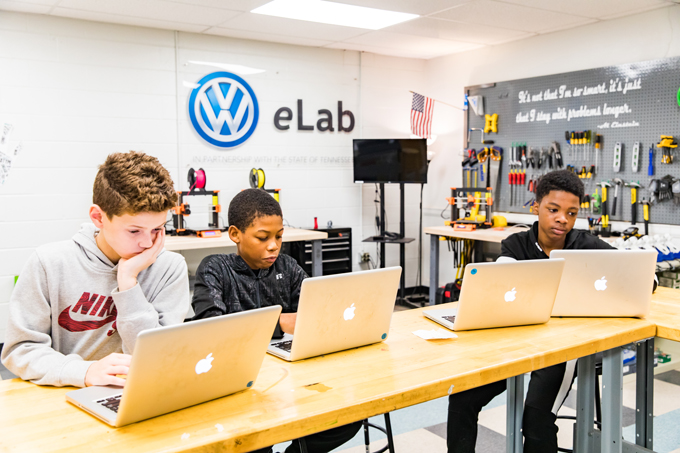 Today’s schools, libraries, museums, and communities are creating learning spaces for engaging in hands-on activities such as makerspaces, innovation labs, or fab labs. These spaces have evolved to be interdisciplinary centers that personalize learning for individual, diverse learners working in collaborative settings (for more background, explore my previous articles, “Learn By Doing: Exploring Values, Networks, and Genres” and “Making It Social: Considering the Purpose of Literacy to Support Participation in Making and Engineering”). When designed well, these spaces contextualize learning around participants’ goals and offer rich opportunities for exploratory learning for novice and expert technology users alike.
Today’s schools, libraries, museums, and communities are creating learning spaces for engaging in hands-on activities such as makerspaces, innovation labs, or fab labs. These spaces have evolved to be interdisciplinary centers that personalize learning for individual, diverse learners working in collaborative settings (for more background, explore my previous articles, “Learn By Doing: Exploring Values, Networks, and Genres” and “Making It Social: Considering the Purpose of Literacy to Support Participation in Making and Engineering”). When designed well, these spaces contextualize learning around participants’ goals and offer rich opportunities for exploratory learning for novice and expert technology users alike.
Despite their potential, makerspaces often struggle to create a sense of inclusivity for diverse learners, language learners, and diverse cultural groups. With funding from the National Science Foundation, educators from around the United States will gather face to face and virtually to develop methods, tools, and resources to tackle this issue.
From February 25–28, 2019, the University of Arizona will host this unique synthesis and design workshop for 80 participants. It will take place at Biosphere 2, a unique learning environment dedicated to researching global scientific issues. The facility serves as a laboratory for controlled scientific studies, an arena for scientific discovery and discussion, and a far-reaching provider of public education.
This broad national group will draw interdisciplinary participation from both practitioner and researcher groups. Participants will identify issues, discuss possible solutions, and create prototypes and materials that address equity and inclusion in technology-rich learning environments.
Focus areas for collaborative work include developing the following:
- Design principles and practices that promote the inclusivity of learning spaces
- Methods for documenting learning in ways that are linked to outcomes and impacts for all learners
- Opportunities to use new technologies in diverse settings for diverse purposes
- Structures and tools for facilitating and promoting dialogue and peer-to-peer learning
- Design features that maximize the intersection between diverse learners, the learning environment, and new technologies
This workshop will encourage the exchange of innovative ideas, surface challenges and opportunities, connect practical and research-based expertise, and form cross-institutional and cross-community partnerships that envision, propose, and implement opportunities that support our collective understanding. Outcomes will address equity and inclusion for all learners.
If you are interested in getting involved in this effort or attending the workshop, contact Jill Castek, associate professor at the University of Arizona, at jcastek@email.arizona.edu. Scholarships for travel and accommodations are available.
Jill Castek is an associate professor in the College of Education at the University of Arizona. Find her on Twitter @jillcastek.